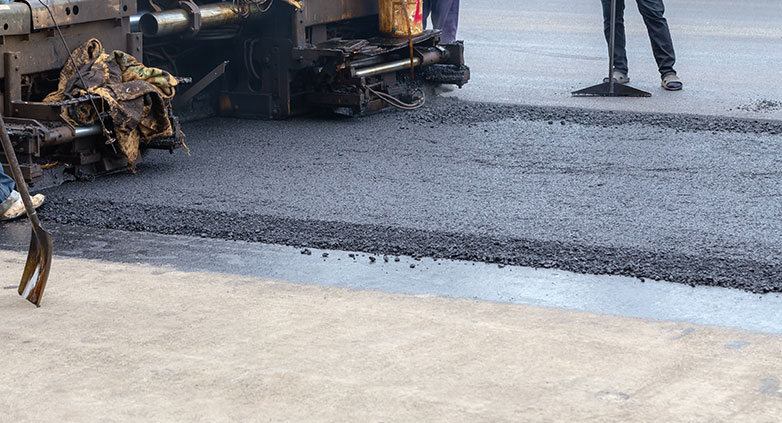Asphalt Over Concrete – What You Need To Consider
The application of asphalt to a concrete surface is a common practice in many places, and as a property owner, you may be considering paving asphalt over your concrete surface.
Truthfully, asphalt is used every year to repave miles of concrete roads and highways. Concrete is, of course, an effective and strong material that you can use as a foundation or base for different pavement projects.
So, is it possible to install asphalt over an existing concrete surface?
Whether you are considering resurfacing your parking lot or replacing your existing driveway, it is possible to overlay asphalt over your concrete surface if elevations allow for it. This practice can help you reduce labor costs and time. Nevertheless, the process does not work in all situations as there are big downsides attached to it.
Broadly speaking, we recommend you first remove the existing concrete before laying it on asphalt because of the following drawbacks:
- Pouring asphalt on a concrete surface decreases the durability of your driveway or parking lot
- A sub base concrete driveway is different from a sub base asphalt driveway which poses a serious threat to your pavement’s flexibility, stability, and strength
Is asphalt overlay on concrete a risky practice, and is it suitable for my driveway?
Overlay of asphalt over concrete is a common practice in constructing roads, including city streets, county roads, state highways, interstate roads, etc. This is because concrete is strong, durable, and solid, allowing the asphalt to be laid above to compact well. Although this method is easier and has many benefits initially be aware that if you choose to go this route, there are some long term risks that are attached.
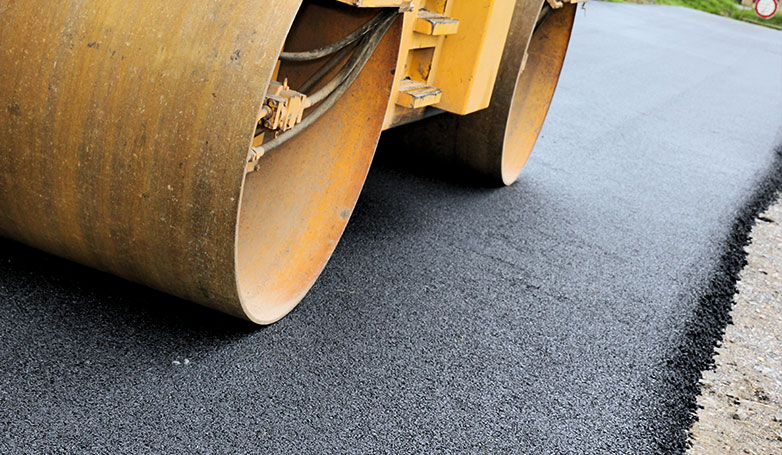
Is it possible to install asphalt over concrete?
Yes, it is possible to pave asphalt over an old concrete roadway, driveway, or parking lot; however, we do not recommend it due to its many drawbacks. Although paving asphalt on concrete is safe, there are many reasons we do not endorse this practice.
Instead of paving over concrete and assuming that the base will hold, turn to a reliable paving contractor in your area to offer you the most reliable method.
Fortunately, concrete is recyclable; thus, there is no need to be concerned about wasted materials when working with a professional paving contractor in your location. Although it can take some time to remove the current concrete and substitute it with a proper sub-base, it’s an investment that will significantly reduce the cost of maintenance and ownership stress in the years to come.
Why you should not install asphalt over concrete
There are many reasons why you should avoid asphalt overlay on concrete. Including:
- Asphalt requires a strong base
- Expansion joints can result in cracking
- It can decrease longevity
If your biggest worry is a quick turnaround time, you may be tempted to call in a professional to install asphalt over a concrete foundation. This is a possible but not advised method. So, be careful of contractors willing to provide this solution without specifying the potential downside.
Concrete is strong and resilient like asphalt, so most concrete structures are dependent on a thick slab instead of a firm base. This is perfect for a concrete pad before the slab cracks and creates a deep structural problem, implying that contractors rarely prepare a concrete sub-base to the same specific standards as an asphalt sub-base.
Asphalt needs a reliable base to withstand heavy loads or years of shifting; else, you will end up with a cracked and deteriorated surface. Asphalt is cheaper and simpler to substitute, but it’s not as durable as concrete. To prevent cracks under normal weight loads, it needs a firm, stable, and flat base.
Once you start noticing cracks in the fresh asphalt poured over your concrete surface, you will have few easy ways to solve the problem. Removing all the existing concrete, sub-base, and fresh asphalt is the perfect alternative to replace it the right way. This is because by installing it the correct way, you will be avoiding excess costs and irritation
It requires a Strong Base:
Your asphalt paved driveway’s longevity will depend on the strength of the base underneath. However, bear in mind that laying asphalt over concrete will not achieve great results because asphalt overlay can not adhere to all concrete surfaces. If the concrete foundation is weak or unstable and the concrete cracks and joints shift with expansion, the asphalt base is undermined before installing the asphalt.
Therefore, any asphalt laid on top of it will be damaged by a concrete base that shifts with traffic. So, with traffic, the paved asphalt surface will move slightly as concrete slabs break. As long as the concrete has an unstable base, this movement may happen more frequently. The whole section (or one side) can be affected by this abnormality.
The practice of asphalt overlay is one of the many ways contractors create formidable roadways, driveways, and parking lots for commercial properties and residential areas. With concrete, a professional paving contractor will install a thicker slab for a driveway, roadway, or parking lot that would last for a long time.
Sad to say, this implies that concrete contractors do not focus on ensuring that the base is adequately prepared as you would for a driveway paved with asphalt. The stronger your asphalt pavement’s base, the more it will last. Also, if the concrete surface becomes uneven, there will be a greater likelihood that an overlay of asphalt would be a wrong thought

Expansion joints
The standard process is to pour concrete surfaces in sections, leaving cracks (termed expansion joint) between the sections. These expansion joints may expand with constant freeze/thaw of the soil, allowing the sections to extend outside the intended range.
If you lay asphalt over concrete and a crack results in the concrete, a crack in the asphalt can result. Thus, even regular expansion joints can lead to the need to repair the asphalt after a few years.
Expansion joints can shift over time, resulting in concrete cracks and a weakened foundation. Hence, overlaying asphalt on concrete would potentially contribute to this new asphalt developing cracks in the same places with cracked concrete expansion joints underneath. This can most usually happen during contraction and expansion owing to heat and freeze-thaw periods
Since wide cracks can’t usually be filled in a way that provides acceptable results, broad gaps between concrete parts are typically an indicator that an overlay is not suitable.
Decreased longevity
You wouldn’t want to pay for asphalt replacement without getting the expected durability. Hence, it would be best if the existing concrete pavements are dug up before applying new asphalt. Your roadway, driveway, or parking lot would last for a prolonged period if you give it a stable base.
Since fluctuating temperatures cause expansion and contraction in asphalt pavement, it requires a robust and stable base that concrete can not offer. The general lifetime of asphalt (if asphalt over concrete is performed) will be cut short because of these unstable base conditions, and this asphalt will require extra fixes sooner and more often.
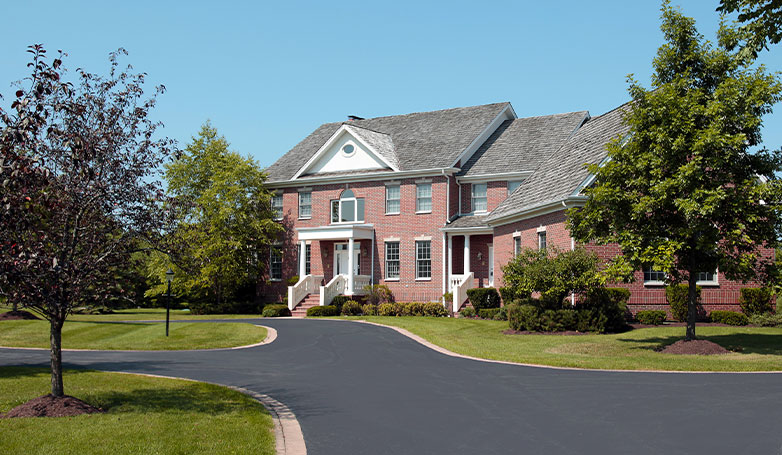
Why you may want to make the change to asphalt
Many homeowners may want to switch from concrete to asphalt when their pavement deteriorates because of the many advantages asphalt offers. That is why asphalt roads, driveway, and parking lots are predominant in almost all cities of the world.
Since prehistoric times, concrete has been used to construct roads, but since the invention of asphalt, it has become the pavement material of choice for most households.
There are lots of reasons why many people may want to switch to asphalt in the construction of driveways, roadways, parking lots, etc. Some of the reasons are:
- Asphalt paving is more durable and strong
- Asphalt paving is easy to install and cost-effective to maintain
- Asphalt paving maintains its aesthetic for a very long time
When considering driveway or parking lot repair or reinstallation, you may be wondering whether you need to have the concrete removed or simply pave over it. The deciding factor here is what lies beneath.
While concrete itself is strong and can offer a great base, it would be best to remove the existing concrete before proceeding with the paving project with asphalt.
Although it is safe to switch to asphalt from concrete, it is recommended that you first demolish the existing concrete pavement before installing new asphalt. Because overlaying asphalt over concrete has a potential side effect and other things to consider.
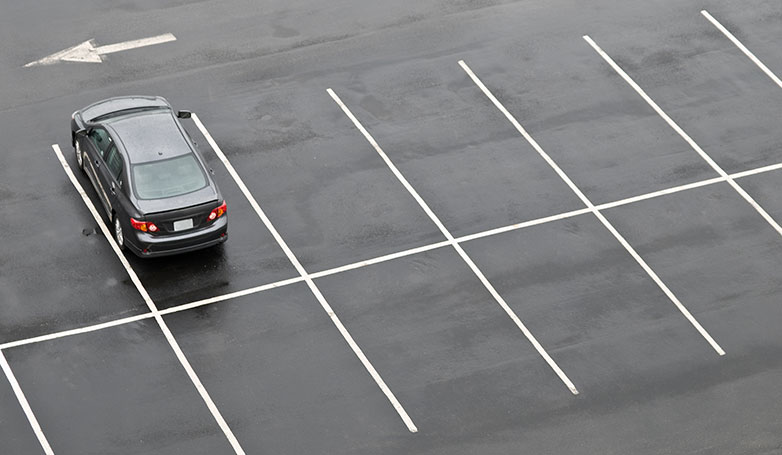
The advantages of asphalt over concrete
Many commercial and residential parking lots, roadways, and driveways are paved with concrete or asphalt. And there are pros and cons for both materials, so it’s necessary to discuss which one is better for your specific application. While both asphalt and concrete are pocket friendly, asphalt offers many benefits over concrete.
If you consider paving your parking lot or driveway or refinishing the old ones, you may probably be wondering about the unique advantages asphalt has over concrete. Below are the advantages that asphalt has over concrete:
- Asphalt pavement is easier and cheaper to install and maintain
- Asphalt provides more durability than concrete
- Asphalt pavement retains its aesthetic for a very long period
Asphalt provides more durability than concrete.
Asphalt and concrete are both solid and durable materials for pavements. Asphalt, however, is more robust and lasts longer compared to concrete. The flexibility of asphalt pavement makes it more durable and stronger than concrete. Asphalt can withstand extreme temperature changes since it expands and contracts following temperature changes; however, concrete flakes during winter when the temperature is freezing.
Again, asphalt can handle heavy vehicle traffic on its surface for a longer time than concrete because it is very much more formidable. Asphalt paving can handle heavy rainstorms (particularly when seal-coated) without being damaged, but concrete typically experiences breakage and cracks after a snowfall and heavy rain.
Furthermore, asphalt paving has a dark rich color that collects and traps the heat of the sun and therefore melts snow and ice more quickly and effectively than concrete. Hence, the preference of asphalt over concrete by many homeowners.
Asphalt pavement is easier and cheaper to install and maintain
Asphalt installation, maintenance, and repair are very much cheaper and easier than concrete. The cost of installing concrete is far more than paving with asphalt, based on the current market industry installation costs per square foot. Often, constructing and using an asphalt pavement will take you considerably less time than concrete pavement.
Also, it takes less than 48 hours to install an asphalt driveway or parking lot, and it would be ready for use within a few hours. While concrete pavement installation will take up to a week and more time would be needed before you can use it.
Regarding maintenance, asphalt pavement is much easier. You only get to sweep and clean it many times a month to remove all the debris and unwanted materials on its surface. Concrete pavement, however, requires consistent and expensive maintenance to prevent chipping, cracking, and lots of other defects.
Asphalt pavement retains its aesthetic for a very long period.
After installation, asphalt paving maintains a dark rich color that provides your parking lot or driveway with a very aesthetic appeal. Compared to concrete, asphalt is much more natural and maintains its aesthetic for a longer time than concrete. This is possible when you frequently apply a fresh seal coat.
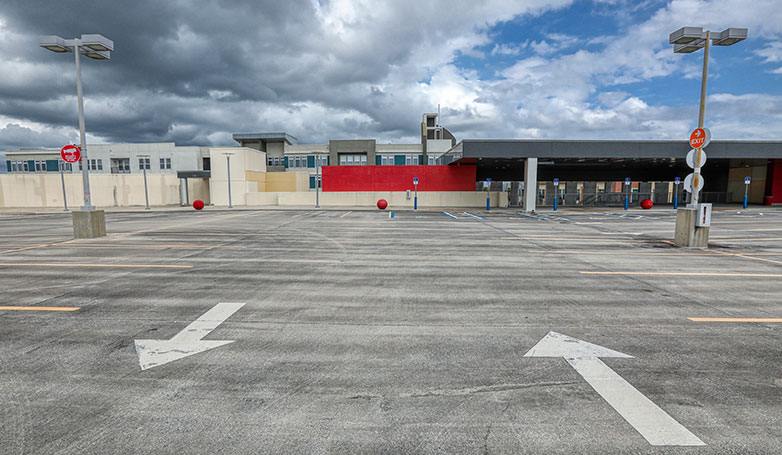
The cost of removing a concrete driveway or parking lot
Whether you pave asphalt over concrete parking or your roadway is purely concrete, you may want to remove it and give it a new life when it starts to crack and fail.
Demolishing a driveway or parking lot means breaking it up, removing the concrete debris and properly disposing of it, and restoring the site grade.
The cost of removing concrete pavement varies. It usually depends on the concrete thickness, the level of site preparation required, the complexity of the parking lot or driveway, and the location.
With that said, the national average cost varies from $500 to $5,000. However, most homeowners and business owners spend about $1,846 to have 600 square feet of concrete pavement removed.
Cost of laying asphalt over concrete pavement
Asphalt overlay involves a thinner layer over an existing concrete surface. Asphalt overlay over concrete parking lot or driveway usually costs between $3 to $7 per square foot. While it is a typical job, frequent maintenance would be required (at least once a year) always to keep your pavement in good condition.
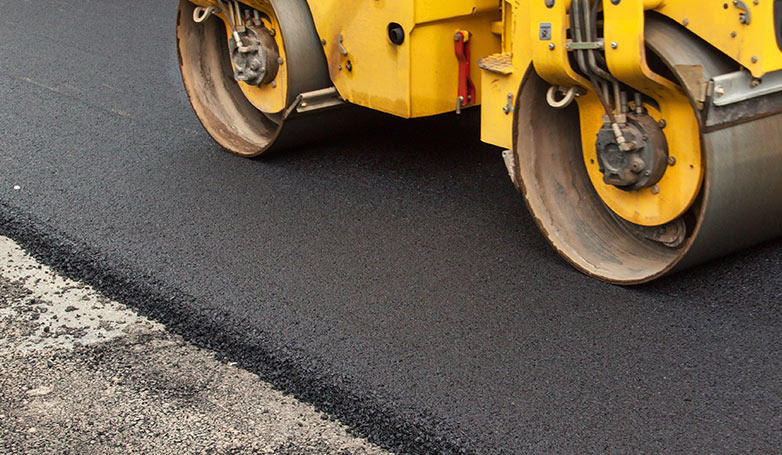
Conclusion
If your pavement is giving signs of repair, and you are considering refinishing it, it would be best if you demolish the entire pavement to achieve great results.
Laying of new asphalt over concrete surfaces is a common practice of many paving contractors. While this practice can save you some dollars, including other advantages, it has a long term adverse effect on your parking lot or driveway.
Most importantly, you should bring in a professional paving contractor to have your pavement assessed and recommend the method that would work well for you in the long run.

